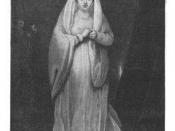William Shakespeare?s play, Macbeth, abounds with greed, murder and betrayal. The plot centers on its primary characters, Macbeth and his wife, Lady Macbeth. Macbeth is a general in King Duncan?s army whose ambition drives him to treason and murder. Lady Macbeth is equally ambitious, but much more devious. When Macbeth hears a prophecy that he will one day be king, he plots with his wife to kill King Duncan to insure the prophecy will come true. At one point, Macbeth reflects on the actions which he is about to undertake and considers backing out. Ultimately, it is Lady Macbeth who sets things in motion and the dreadful deed is committed. Though it is dark and violent, the ending of this tragedy leaves the audience with a positive feeling and indicates political stability and hope for Scotland?s future. Roman Polanski?s screen adaptation of Macbeth, released in 1971, is equally dark and violent, but he leaves the audience questioning what may come next.
Polanski?s version suggests that the greed and violence may be a vicious, never-ending cycle.
A comparison of Polanski?s version and the original text of Shakespeare?s Macbeth strongly indicates that Polanski?s vision and interpretation were colored by the tragic events that took place in his life during the production of this film. Two years prior to the film?s release, Roman Polanski?s wife and unborn child were killed in a vicious act of brutality. The grief he suffered and the guilt he endured led him to seek new avenues in which to express his creativeness. According to Virginia Wright Wexman in Roman Polanski: Two years earlier, his pregnant wife and three of his friends had been senselessly murdered by a cult led by Charles Manson. The experience spurred the director to look beyond the decadence of contemporary culture for material...


